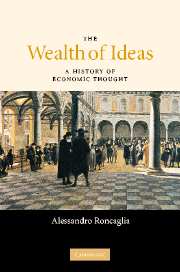Book contents
- Frontmatter
- Contents
- Preface
- 1 The history of economic thought and its role
- 2 The prehistory of political economy
- 3 William Petty and the origins of political economy
- 4 From body politic to economic tables
- 5 Adam Smith
- 6 Economic science at the time of the French Revolution
- 7 David Ricardo
- 8 The ‘Ricardians’ and the decline of Ricardianism
- 9 Karl Marx
- 10 The marginalist revolution: the subjective theory of value
- 11 The Austrian school and its neighbourhood
- 12 General economic equilibrium
- 13 Alfred Marshall
- 14 John Maynard Keynes
- 15 Joseph Schumpeter
- 16 Piero Sraffa
- 17 The age of fragmentation
- 18 Where are we going? Some (very tentative) considerations
- References
- Index of names
- Subject index
13 - Alfred Marshall
Published online by Cambridge University Press: 22 September 2009
- Frontmatter
- Contents
- Preface
- 1 The history of economic thought and its role
- 2 The prehistory of political economy
- 3 William Petty and the origins of political economy
- 4 From body politic to economic tables
- 5 Adam Smith
- 6 Economic science at the time of the French Revolution
- 7 David Ricardo
- 8 The ‘Ricardians’ and the decline of Ricardianism
- 9 Karl Marx
- 10 The marginalist revolution: the subjective theory of value
- 11 The Austrian school and its neighbourhood
- 12 General economic equilibrium
- 13 Alfred Marshall
- 14 John Maynard Keynes
- 15 Joseph Schumpeter
- 16 Piero Sraffa
- 17 The age of fragmentation
- 18 Where are we going? Some (very tentative) considerations
- References
- Index of names
- Subject index
Summary
Life and writings
Alfred Marshall (1842–1924) was not among the protagonists of the 1871–4 ‘marginalist revolution’: his first major writings belong to the end of the 1870s, and his main contribution, his Principles of economics, appeared in 1890, nearly two decades after the works of Jevons, Menger and Walras. Marshall himself was averse to considering the new road taken by economic analysis as a ‘revolution’ or a clear-cut break with the past: in his opinion, this was instead a step forward, although certainly an important one, relative to the classical economists’ (in particular Ricardo's and the Ricardians’) approach. Indeed, his personal contribution, in his own opinion, consisted in the synthesis between the great tradition inherited from the past and the new yeast of the subjective approach. Yet, we must recognise that Marshall contributed more than anyone else, possibly at least in part against his own intentions, to ‘shunt the car of economic science’ in the direction of that approach (which Hicks, Stigler and Samuelson preferred to call ‘neoclassical’, rather than ‘marginalist’ or ‘subjectivist’, in order to stress that the turn-around implied an important element of continuity with the past) which still today dominates the teaching and thinking of economists all over the world.
Marshall was born in London, on 26 July 1842, to a modest bourgeois family. His father, authoritarian if not tyrannical within the family, was a modest clerk of the Bank of England.
- Type
- Chapter
- Information
- The Wealth of IdeasA History of Economic Thought, pp. 350 - 383Publisher: Cambridge University PressPrint publication year: 2005

